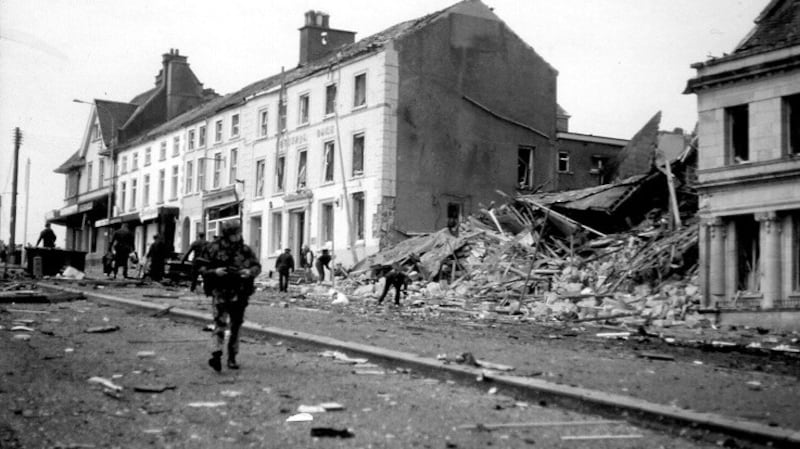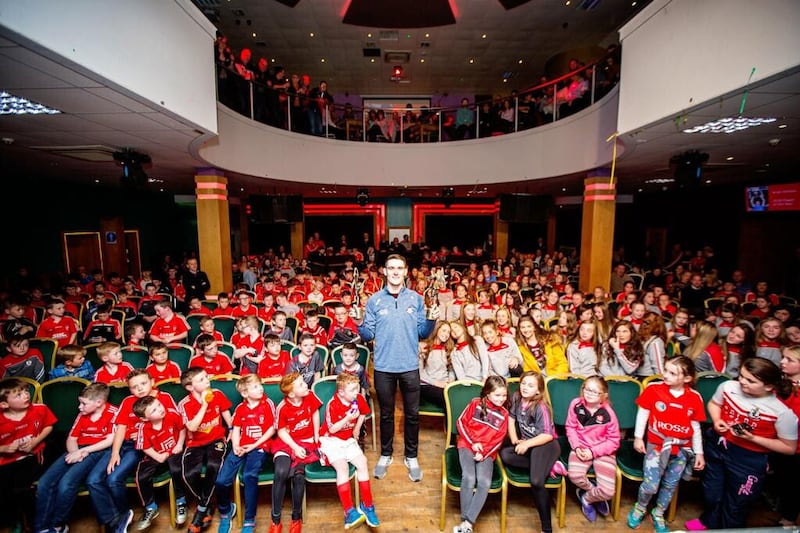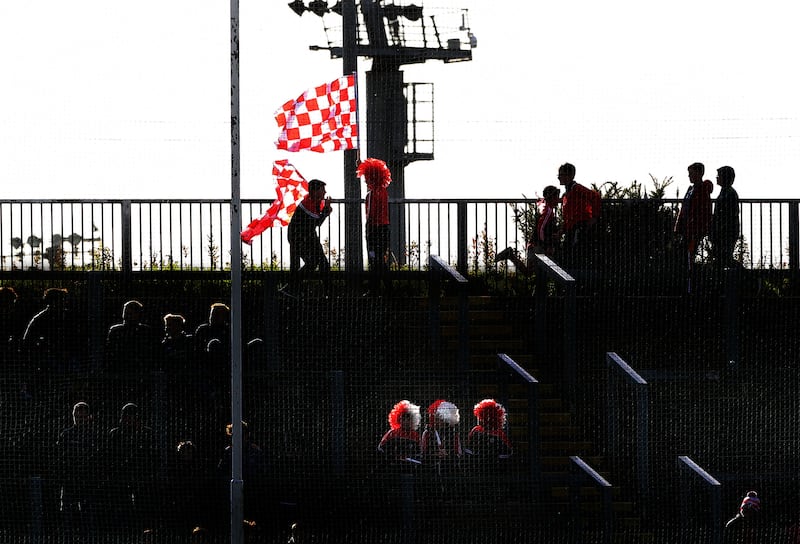IT’S exactly a mile-and-a-half between the entrance to the small terraced houses in Beechland and the pillars at Rossa Park.
Patsy Monaghan walked that stretch of Magherafelt with his sons every Sunday, stopping at Ann McKee’s shop opposite the chapel for a packet of Opal Fruits.
“My Da must have thought we were getting one of our five a day,” laughs one of those sons, Gerard.
The Sky Blues’ soccer pitch at Spires Park was less than 500 metres away if these children of the ‘70s were on for hopping a few of the neighbours’ fences.
Rainey Old Boys rugby club were at that end of the town as well.
Gerard Monaghan would play for the Rainey from his early 20s until he was 40. Flirted a bit with the soccer.
But Gaelic football was the day-and-daily.
Virtually nobody from Magherafelt goes to St Pat’s Maghera now. There weren’t all that many even in those days, but Monaghan did. He ended up part of the school’s first-ever MacRory Cup winning team in 1977.
He was a young lad on the panel when Magherafelt won a senior championship the following year.
For the next decade he chipped away but it was one step forward and two back.
They reached two more finals in ’79 and ’83 before the team broke up.
By the time the Rossas returned to the Derry decider, in which they beat debutants Glen four years ago, his son Jared could see the twilight of his own career beckoning.
Gerard and Jared Monaghan were the only father-and-son link between the 1978 team and the 2019 one.
Ciaran Higgins came off a rare minor championship-winning team in 1992.
He’d won a MacLarnon Cup earlier in the year. Henry Downey was teaching in St Mary’s and was enlisted to take the team. Their victory was the school’s first significant step in colleges football, which had only changed from a Convent school and started taking boys in 1978.
His senior career lasted almost two decades.
“From that minor team, really only myself, Barry Dillon and Eamon Lennox went on to play senior for any length of time,” he says.
On Saturday past, Higgins managed Magherafelt minors as they beat Lavey in the county final by two points, 2-5 to 1-6.
It was only the sixth Derry minor title of an 89-year history that started when future GAA president Paddy MacFlynn drove its formation as a young lad.
Two of those have come out of four finals in the last five years.
Magherafelt have won more underage titles in the last decade than in the previous 40 years combined.
Their U15s swept the board this year, winning those Derry and All-Ireland Féiles as well as the league and championship.
Higgins’ son Caolan was one of the half-dozen Magherafelt lads that won an All-Ireland minor title earlier this year under Damian McErlain, who then joined Higgins’ management team alongside Jared Monaghan, Geoffrey Higgins and Johnny Kelly, three stalwarts.
There is a red Rossa streak that runs right through Derry’s inter-county success of recent years.
Conor McCluskey is almost certain to become only the club’s second Allstar after Gary Coleman.
Eoin McEvoy is favourite to win Young Footballer of the Year.
Odhran Lynch saved three penalties in the Ulster final to emulate his uncle Mickey in winning back-to-back provincial titles.
McCluskey qualified from Queen’s in Actuarial Science and Risk Management and now works in the booming industry. Entry requirements are an A* and two As.
“He’s a young fella that could be away in London or New York making an absolute fortune but he’s chose to stay in Magherafelt,” says Higgins.
Their three county players, all born of outside parents that migrated to the town, typify how the club has learned to play to its own strengths and manage its weaknesses.
McCluskey’s father Emmett is from Loughgiel and his mother Mary was McKelvey from Errigal Ciaran direction, a former Tyrone and Queen's camog who dominated sports days and community games around Ballygawley for years.
Odhran Lynch’s dad Eamon was an All-Ireland minor winner from Banagher.
Eoin McEvoy’s father Aidan played for Dromara in Down.

He caught the eye not just for his performances but with the way he carried himself as captain of St Mary’s second MacRory Cup winning team last year.
Recently-graduated Business student Lynch played on the school's first winning team.
McEvoy was only prevented him from being thrown straight into the Derry senior team at 18 by injury, virtually unheard of in modern inter-county football.
This summer, a whole year older, he did get in. That freed Brendan Rogers to midfield and he repaid the trust by keeping Paul Geaney scoreless in an All-Ireland semi-final.
There’s plenty out in the world to take those lads away, but they don’t seem to want it.
“They see the opportunity we have ahead of us in the next ten years because we’ve never had a conveyor belt of talent coming through that we now have and will have in the next ten years,” Higgins says.
Their parents all brought the kids straight down to the Rossa Ógs, which have been running for children of primary school age since the early 2000s.
That was where things really started to turn for the club.
* * * * *
But which lorry
Was it now? Young Agnew's or that other,
Heavier, deadlier one, set to explode
In a time beyond her time in Magherafelt...
Seamus Heaney, Two Lorries
MINUTES before 10.30pm on Sunday 23 May, 1993, a stolen Transit van was parked outside the bus station on Broad Street in the middle of the town.
It contained explosives that estimates afterwards ranged at everything from 150lb to 1,500lb.
The warning was phoned in just 20 minutes before it exploded.
The British Army and RUC had just about enough time to clear the area of people.
Everything within ten miles shook. The bus station was completely demolished. All 20 businesses on Broad Street were wrecked, including the town’s three banks.
The IRA’s intentions were very deliberate. It was the fourth such bomb in four days, two in Belfast and one in Portadown.
The cost of repairs from the four attacks ran to £25m and more.

Magherafelt’s night-time streets were classed as an “economic target”.
Seamus Heaney’s poem Two Lorries, written at the height of his career a year after he won the Nobel Prize for Literature, was about whether the dust was from Agnew’s old coal lorry or the Broad Street bomb.
It all had to be completely rebuilt.
In the years afterwards businesses shut down, they lost factories and jobs, but the town kept on trying to heal.
Three days after the bomb exploded, leaders of the town’s four main churches came together to host an inter-denominational service where the bomb exploded. Hundreds of people attended.
For a mixed town (around 60 per cent nationalist), Magherafelt almost completely escaped the Troubles.
Rainey Endowed school, albeit predominantly Protestant, was mixed.
The Old Boys’ rugby club has a long history of Catholics routinely playing for it, back as far as anyone can remember. There was enough soccer to go around for anyone that wanted it.
Sport was always one of its strongest crutches.
That all stands to it now. It is one of the fastest-growing towns in the north. Houses and graduate jobs multiply.
A new £35m bypass around it towards Cookstown and its proximity to the £190m road that has cut the run to Belfast to barely 40 minutes. In the era of hybrid working, it’s become attractive to young professionals.
A lot of those are coming out of the town itself. With a 100 per cent pass rate at GCSE, St Mary’s was named the Sunday Times’ number one secondary school in the north last year.
As a town, Magherafelt is booming.
The GAA club are making hay off it.
* * * * *
THE day before the Rossa Ógs started, Gerard Monaghan walked into Dunnes Stores in the Meadowlane shopping centre that he had managed for the first few years after it opened.
“I remember going in and buying 15 plastic footballs at £1 each. That’s what we started with.”
It’s going on nearly 25 years since a small group of people got together and decided to do something about the club’s failure to reach its growing potential.
One of the first people the youngsters coming through the gates would have met was Brigid Heavron.
She passed away sadly in 2011 but her name, just like that of Patsy Monaghan, lives on through a vibrant annual underage tournament.
When Brigid’s son Danny, as captain, collected the John McLaughlin Cup four years ago, he was stopped on the steps by his clubmate, BBC presenter Thomas Niblock.
Magherafelt had beaten Glen by a single point. Asked what he was thinking in the final moments of the game, an unforgettably emotional Danny said: “I was praying to Mammy, that she would see it through.”
He talked candidly too about emulating the great Gerry O’Loughlin, captain in ’78, and of how this was a day they’d look back on “in 50, 60, 70 years’ time when you’re burying your friends”.
You could see in Danny Heavron’s tearful eyes how much he cared.
They always had the Conan and Murtagh O’Briens, the Kieran McGlones and Philip Collins’, the lads who gave their soul to it and whose time ran agonisingly out just before 2019.
But for too long, too few had been willing to shed blood or tears for it.
For most of Magherafelt, Gaelic football was just something for lads to be at on a Sunday.
It took a long time and a lot of work for the club to get past that.
Enda Quinn recalls the same walk out of the town that they all made. One of the heartbeats of their coaching group, the club won three out of four U14 championships in around his age group. Nothing material came of it.

“Nobody had cars and we all walked places. The pitch is exactly a mile from the middle of the town.
“You had the soccer club and the rugby club in the middle of the town, it was just handier for boys. I’d say that had to be a factor.”
They recall Joe Brolly once saying that they were renowned for producing great under-14 teams, a compliment on a bed of nails. But it was laced in uncomfortable truth.
Magherafelt won an All-Ireland Féile Division Two title this year to add to their Division One titles from 2007 and 2018.
Féiles have become a target, but not just for the sake of winning them.
“Some people might find it strange but the big prize in winning Féiles for us was that we got away for weekends,” says Higgins.
“That allowed us to build a Rossa community by building friendships among parents and a connection with the club that we maybe hadn’t got in the past.
“Essentially we were trying to bring a rural culture into a town club.”
The first of those Division One titles had pitted them up against Brian Fenton’s Raheny team in the final.

In 2018, the Dublin star was awarded Footballer of the Year at the GAA’s Allstars. That was on a Friday night.
Two days later he was stood in the hall at O’Donovan Rossa surrounded by hundreds of young and old faces, regaling them over how he still had nightmares about marking Fergal Duffin.
That team went on to beat Kilcoo in an Ulster minor semi-final three years later only to lose three players the week of the final and fall by a point to Lámh Dhearg.
Eight of them were still involved in the 2019 senior championship win. That in itself represented progress.
“We had a big dropout over the years and that’s where things have changed. Player retention is at a completely different level,” says Ciaran Higgins.
It didn’t come easy.
A group of people put their shoulders to the wheel and carted young ones the length and breadth of Ulster every single weekend.
Most weeks, no matter how far they went to get away, they’d look up and see the same green-and-gold that will face them in Celtic Park on Sunday.
“When we were travelling the country to U8 and U10 tournaments and you’d look across, Glen were on the other pitch,” says Higgins.
“You look at both clubs on Sunday, one of the big things is effort.
“People talk about what’s the difference between now and 20 years ago in Magherafelt - for me the big thing is the effort that has went in over that 20 years to change the culture within the club.”







